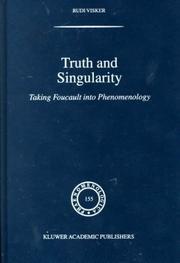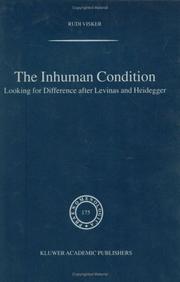| Listing 1 - 3 of 3 |
Sort by
|

ISBN: 0792359852 0792363973 9401144672 9780792359852 Year: 1999 Volume: 155. Publisher: Dordrecht: Kluwer Academic Publishers,
Abstract | Keywords | Export | Availability | Bookmark
 Loading...
Loading...Choose an application
- Reference Manager
- EndNote
- RefWorks (Direct export to RefWorks)
The aim of these essays is to disentangle us from the opposition between universalism and relativism in which so many of the debates in recent contemporary philosophy have been caught. This volume shows that what is in fact returning in these discussions and maneuvering them into a pre-set course is the very ambiguity, `the subject', which they seek to repress.
Metaphysics --- Merleau-Ponty, Maurice --- Heidegger, Martin --- Levinas, Emmanuel --- Intersubjectiviteit --- Intersubjectivity --- Intersubjectivité --- Résonance intersubjective --- Subjectiviteit --- Subjectivity --- Subjectivité --- Truth --- Vérité --- Waarheid --- Truth. --- Intersubjectivity. --- Subjectivity. --- Academic collection --- Subjectivism --- Knowledge, Theory of --- Relativity --- Ontology --- Phenomenology --- Social psychology --- Vérité --- Intersubjectivité --- Subjectivité --- Conviction --- Belief and doubt --- Philosophy --- Skepticism --- Certainty --- Necessity (Philosophy) --- Pragmatism --- Philosophy. --- Ontology. --- Ethics. --- Modern philosophy. --- Philosophy, general. --- Philosophy of Man. --- Modern Philosophy. --- Modern philosophy --- Deontology --- Ethics, Primitive --- Ethology --- Moral philosophy --- Morality --- Morals --- Philosophy, Moral --- Science, Moral --- Values --- Being --- Substance (Philosophy) --- Mental philosophy --- Humanities

ISBN: 1402028253 140202827X 9781402028274 1402028261 1280411929 9786610411924 9400789262 9781402028250 9781402028267 Year: 2004 Volume: 175 Publisher: Dordrecht : Kluwer academic,
Abstract | Keywords | Export | Availability | Bookmark
 Loading...
Loading...Choose an application
- Reference Manager
- EndNote
- RefWorks (Direct export to RefWorks)
At the origin of this volume, a simple question: what to make of that surprisingly monotonous series of statements produced by our societies and our philosophers that all converge in one theme - the importance of difference? To clarify the meaning of the difference at stake here, we have tried to rephrase it in terms of the two major and mutually competing paradigms provided by the history of phenomenology only to find both of them equally unable to accommodate this difference without violence. Neither the ethical nor the ontological approach can account for a subject that insists on playing a part of its own rather than following the script provided for it by either Being or the Good. What appears to be, from a Heideggerian or Levinasian perspective, an unwillingness to open up to what offers to deliver us from the condition of subjectivity is analysed in these pages as a structure in its own right. Far from being the wilful, indifferent and irresponsive being its critics have portrayed it to be, the so-called 'postmodern' subject is essentially finite, not even able to assume the transcendence to which it owes its singularity. This inability is not a lack - it points instead to a certain unthought shared by both Heidegger and Levinas which sets the terms for a discussion no longer our own. Instead of blaming Heidegger for underdeveloping 'being-with', we should rather stress that his account of mineness may be, in the light of contemporary philosophy, what stands most in need of revision. And, instead of hailing Levinas as the critic whose stress on the alterity of the Other corrects Heidegger's existential solipsism, the problems into which Levinas runs in defining that alterity call for a different diagnosis and a corresponding change in the course that phenomenology has taken since. Instead of preoccupying itself with the invisible, we should focus on the structures of visibility that protect us from its terror. The result? An account of difference that is neither ontological nor ethical, but 'mè-ontological', and that can help us understand some of the problems our societies have come to face (racism, sexism, multiculturalism, pluralism). And, in the wake of this, an unexpected defence of what is at stake in postmodernism and in the question it has refused to take lightly: who are we? Finally, an homage to Arendt and Lyotard who, if read through each other's lenses, give an exact articulation to the question with which our age struggles: how to think the 'human condition' once one realizes that there is an 'inhuman' side to it which, instead of being its mere negation, turns out to be that without which it would come to lose its humanity?
Philosophy --- Metaphysics --- filosofie --- existentialisme --- metafysica --- Levinas, Emmanuel --- Heidegger, Martin --- Difference (Philosophy) --- Philosophy. --- Mental philosophy --- Humanities
Book
ISBN: 2802801473 2802803611 9782802801474 Year: 2003 Volume: 98 Publisher: Bruxelles: FUSL,
Abstract | Keywords | Export | Availability | Bookmark
 Loading...
Loading...Choose an application
- Reference Manager
- EndNote
- RefWorks (Direct export to RefWorks)
Sur le plan réflexif, le pluralisme des valeurs ne soulève apparemment aucune difficulté aujourd'hui. Traditionnellement il a toujours posé des problèmes de conflits et de hiérarchies. Afin de résoudre le premier problème, les valeurs ont été confinées dans l'espace de la vie privée ou soustraite à l'espace public et au test d'universalisation qui y « justifie » les institutions ; pour résoudre le second problème, on a entrepris la dévalorisation « généreuse » des valeurs ou leur proclamation a priori comme équivalentes. À reléguer les valeurs dans la sphère exclusive du privé, le risque est grand de les enfermer dans leur particularité, de leur permettre d'occuper ou prétendre occuper la place de l'universel sans aucune forme de confrontation et de gommer leur pluralité. À les relativiser purement et simplement, le risque n'est pas moins grand de voir la place de l'universel envahie, non par une quelconque valeur particulière, mais par ce qui se veut la mesure publique de toute qualité et appréciation aujourd'hui : les items de compétences. Face aux menaces qui pèsent sur le pluralisme des valeurs, sinon sur leur existence, les textes ici rassemblés réinterrogent entre autres ce que représentent les valeurs, leur pluralité, leurs liens, leurs conflits et leur prétention à l'universalité.
Values. --- Universaux --- Universals (Philosophy). --- General ethics --- Universals (Philosophy) --- Individuation (Philosophy) --- Individuation (Philosophy). --- Valeurs (Philosophie) --- Individu (Philosophie) --- Values --- #GOSA:V.A.M --- Axiology --- Worth --- Universals (Logic) --- Individuals (Philosophy) --- Individuation --- Particulars (Philosophy) --- Aesthetics --- Knowledge, Theory of --- Metaphysics --- Psychology --- Ethics --- Logic --- Philosophy --- Scholasticism --- Whole and parts (Philosophy) --- Haecceity (Philosophy) --- universel --- institution --- valeur --- particulier --- vie privée --- pluralisme des valeurs --- éthique publique --- espace public --- pluralisme culturel
| Listing 1 - 3 of 3 |
Sort by
|

 Search
Search Feedback
Feedback About UniCat
About UniCat  Help
Help News
News